Mama Cash Fund to Women Human Rights Defenders Network Uganda. Read More


Mama Cash Fund to Women Human Rights Defenders Network Uganda. Read More
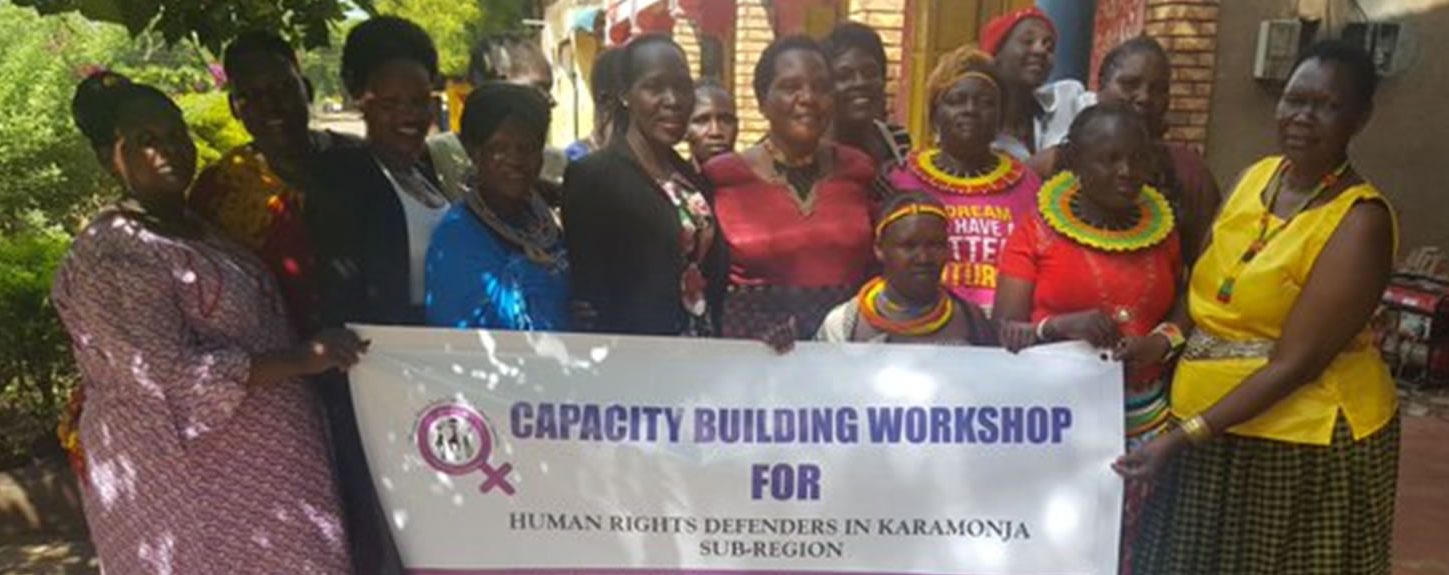
Caption: WHRDs from Karamoja pose for a photo after the workshop.
WHRDS from Karamoja region are involved in fighting against GBV, FGM, Widow Inheritance and defending Land and environmental rights, Child rights, women’s rights among others. These are rights that were formally not observed or respected due to cultural and social norms in Karamoja region. For instance, women were inherited as property upon the demise of the husband. A girl had to go through FGM to be considered a “real woman”. Women did not own land and physical battering was looked at as disciplining a woman or a child.
This has made the work of women defenders increasingly difficult as they maneuver cultural norms to fight against violence inflicted on them. It is a difficult battle that can only be won by speaking out to challenge the existing cultural and social norms. Below are some of the challenges they faced in the course of their work.
A child’s rights woman defender from Amudat district followed up on a case where a young girl had been raped and reported it to the police. To her surprise, the police abused her for making sure of an arrest and the parents of the girl only asked for compensation while resisting the arrest of the perpetrator.
A female journalist and woman defender against Female Genital Mutilation (FGM) from Kapchorwa district narrated how she was attacked by cultural elders for speaking out against FGM. They claimed that it was their cultural norm and a rite of passage to womanhood for their girls in the Sabiny culture. This forced the woman defender to abandon her work in the region for two years as she sought asylum in a new location. It is important to note that girls who underwent FGM suffered excruciating pain, swellings and keloids in their private parts.
In addition, a human rights defender for women’s rights went through an ordeal where she lost her husband and his relatives wanted to take all property she jointly owned with him. She immediately reported the case to Uganda Law Society and got legal support. It could have gone sour if she hadn’t quickly reached out to a legal organization for help.
Another woman defender for reproductive rights recalled an incident where a pregnant woman died due to negligence of the nurse in charge of the labor ward that day. She reported the nurse who was later arrested and taken into custody. This made other medical staff skeptical and they singled her out as a problematic person. They later on refused to give her any medical assistance since that incident yet she was only doing her work as a Human rights defender.
Following the above challenges, the women defenders had a training in Moroto district where they were trained in networking, advocacy and lobbying strategies to enable them build supportive networks among themselves, advocate for human rights as well as lobby duty bearers to take action by protecting them from physical attacks.
They were equipped with human rights advocacy strategies such as research and analysis, networking and co-ordination, planning, implementation, monitoring and evaluation and problem identification. The WHRDs made resolutions and appreciated the strategies stating that they will guide them in their human rights work as they continue to raise their voices against violations in the region of Karamoja.
The WHRDS also raised concerns and requested to be trained in issues of security, given more information on protection, monitoring, reporting and evaluation. They further asked for self-care and collective healing spaces and more opportunities to have networking activities for them.
The WHRDNU took their concerns into account and is committed to providing them with support and spaces to enable them continue with their human rights work.
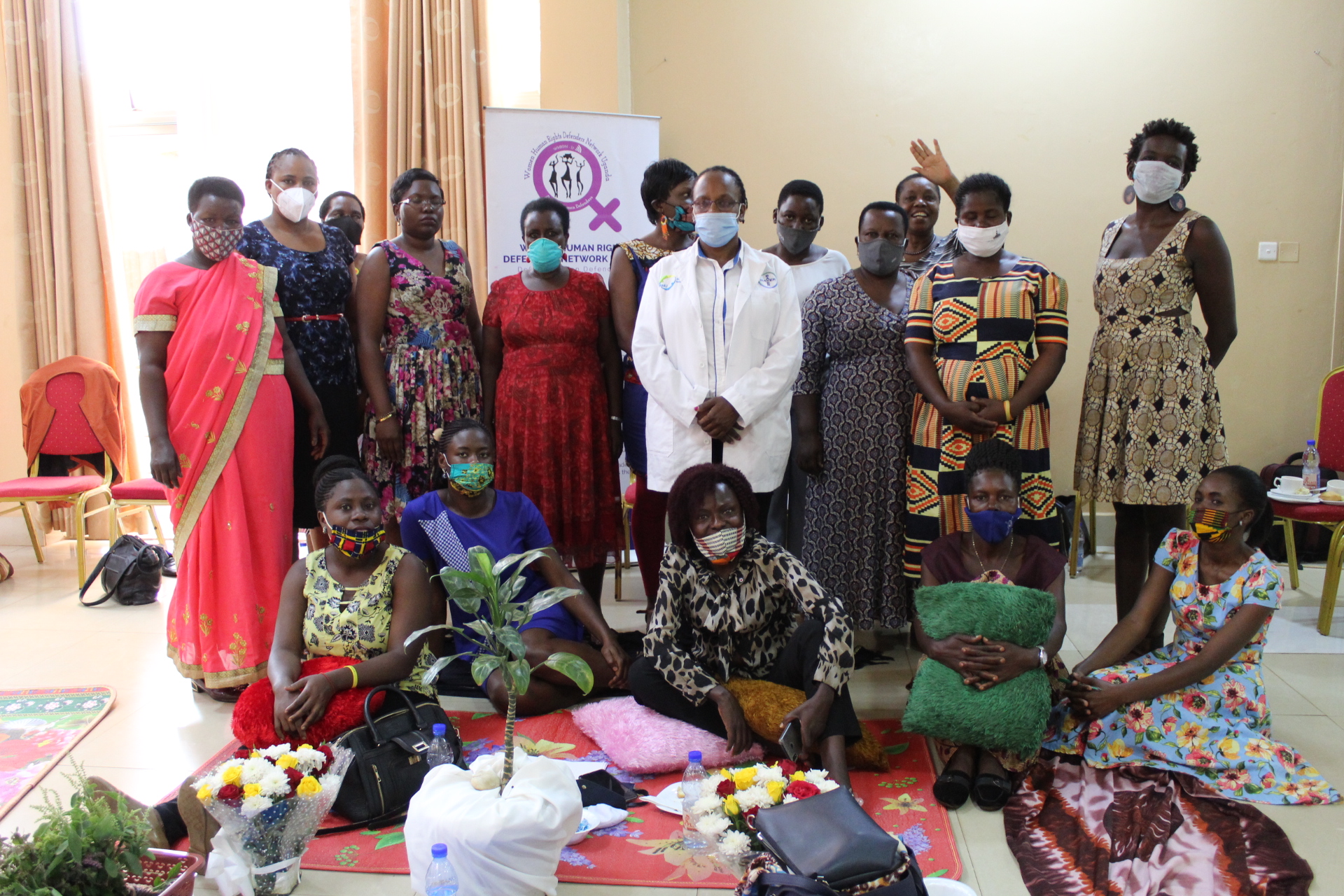
Caption: Group photo of Women HRDs with Dr Linda Birungi.
The WHRDNU held a workshop for 14 WHRDs regional focal person representatives from different sub regions namely Acholi, Lango, Karamoja, Kigezi, Albertine, Rwenzori, Ankole, Busoga, Bagisu, Teso, Sebei, Bukedia, Budama, Bunyoro and rural Buganda under the theme “Promoting a culture of activism rooted in practices of self-care, mutual support and well-being” on 13th – 14th August 2020.
The workshop kicked off with the WHRDNU secretariat welcoming the participants and thanking them for attending the workshop. The objective was reiterated which was to provide a platform and process for WHRDs to deal with emotional and physical trauma and begin to prioritize their own well-being as a personal act. She further mentioned that the workshop is for them to reflect, relax, learn and enjoy. She invited them to feel free since this was a free space for all of them to network and commiserate with each other.
The WHRDs raised several challenges they faced repeatedly which include but are not limited to: Heavy workloads, stress and fatigue, family issues, financial instability, marital problems, personal frustrations and anxiety of what next in life. There was a counselor from Healing Talk Services who encouraged the WHRDs to seek out counseling services at least once a month and also engage in group counseling which reduces the stress of feeling lonely, overwhelmed and individually exposed.
Burden sharing was one of the activities that was done to help the WHRDs unpack the loaded up feelings of fatigue, bitterness and burn-outs that may affect their Human Rights work if not dealt with. A facilitator from Fitclique Africa helped address the several burdens that the WHRDs shared during the session by giving them tips on planning out an entire week and saving some funds to reduce on the stress of unpreparedness and distractions that come because of lack of proper planning.
Healing and care with medical and health practices was one of the sessions that shed light on reproductive health, health risks, and best health practices for WHRDs. Dr. Linda Birungi a gynecologist at Reproductive Health Uganda enlightened the WHRDs about their reproductive health, family planning and menstrual periods. She also advised the ladies to go for cervical cancer screening every after 3 years for those who don’t have HIV/AIDS and every year for those with it.
The self-care, well-being and collective healing workshop ended on a high note with the WHRDs appreciating the help and self-love practices they received and promised to incorporate them into their daily life. A new culture of activism that is rooted in practices of self-care and mutual support was also launched as a necessary condition of women’s movements in Uganda.
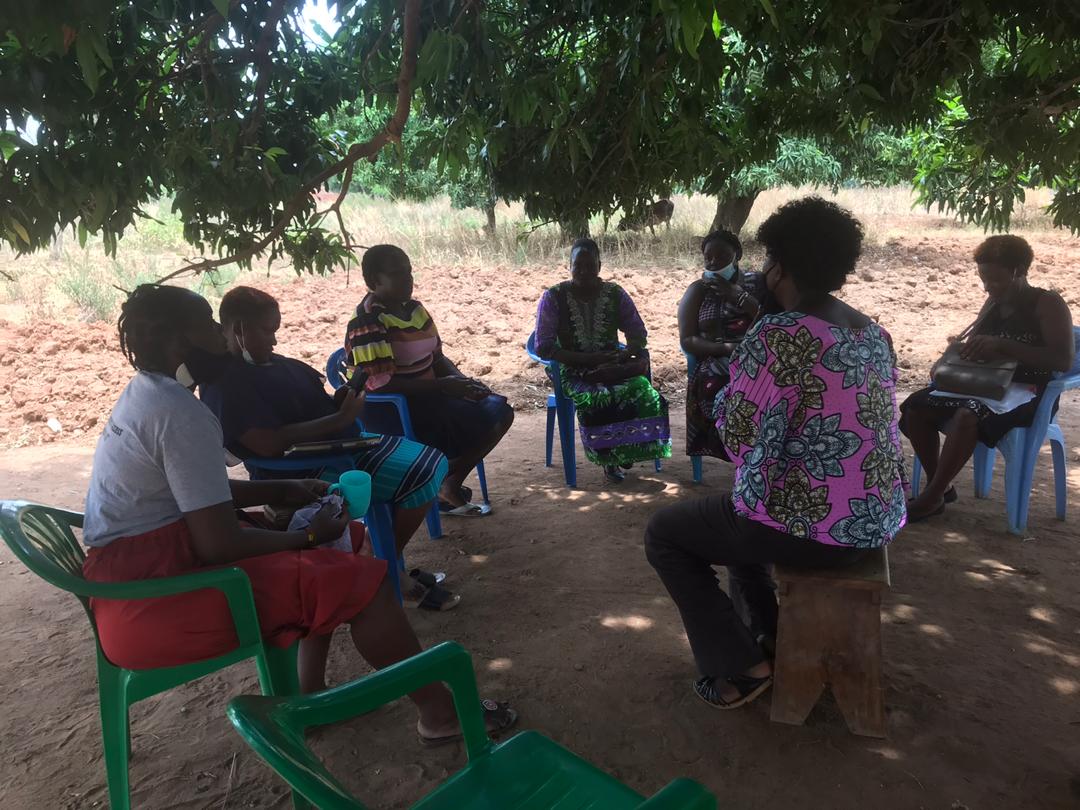
Caption: CEO WHRDNU Brenda Kugonza addressing WHRDs from the West Nile region.
On 22nd July 2020, the secretariat of WHRDNU together with the representative of sexual minorities’ woman defender conducted a Solidarity visit to West Nile. They held a meeting with 37 women human rights defenders from Arua, Koboko and Zombo districts. The purpose of the meeting was to introduce WHRDNU to them and build networks of solidarity from individuals and organizations to ensure their safety and active response to attacks with support from the Women Human Rights Defenders Network Uganda.
The women Human Rights defenders welcomed the presence of the WHRDNU by appreciating their work of supporting WHRDs as being unique, and equally acknowledged that they have always faced different forms of violations like physical assaults, threats on their lives and families, stigmatization and smear campaigns but had nowhere to report or get support and Protection.
A WHRD for Economic rights informed us of how she had been attacked by men in her community accusing her of being disrespectful, stubborn and misleading women to grab land from men. This was simply because she encouraged women to utilize land in their possession, get soft loans to invest and also save to become economically empowered and support their families.
Another WHRD submitted her grievance of being called “loud mouthed” and “nosy” just because she ensures good governance and Human rights while holding duty bearers accountable. Another woman defender recounted to us how she received threats from perpetrators promising to bring harm upon her family. She further faced confrontation from a district chairperson who went as far as talking to her husband about her work interfering in matters that are not of her concern.
A number of female journalists and many more WHRDs interfaced with a series of threats from phone calls warning them to back off, threats of being beaten and being called uncouth names publicly hence making the people in their community shun them and their work.
At the end of this meeting, key milestones were achieved such as the visibility of the WHRDNU, its work of providing protection and ensuring a safe working environment for WHRDs. WHRDNU also shared the list of referral services which the WHRDs can use in case of attacks and need support. The WHRDs were glad to have a hand that supports them after having shared their lived experiences of violations.
The Women Human Rights Defenders Network continues to conduct solidarity visits coupled with capacity building trainings to equip our WHRDs with tools to protect themselves from attacks but also report them when they happen and need support.
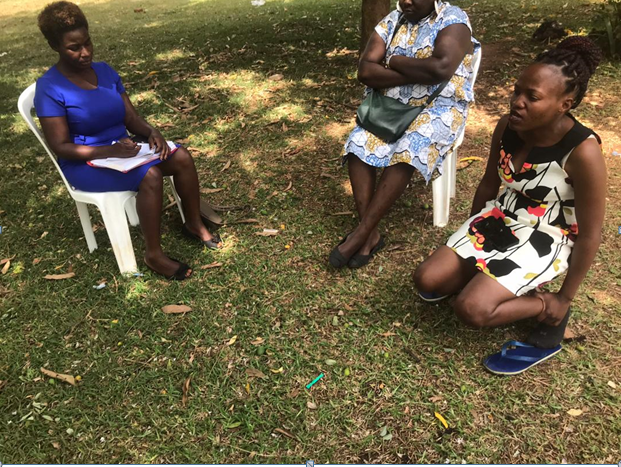
Caption: WHRD Mariam Nakku(right) is facing isolation for the work she does
In the context of strengthening synergies among the WHRDs and ensuring this safety of women defenders during the pandemic and election period, a mission of field solidarity visits took place in March 2021 with Women Human Rights Defenders in Uganda. The WHRDN-U is proud to that through this intervention we kept WHRDs together and safe from various sources of violence that surround them and foster energy of sisters and connect to each other.
The field solidarity visits with women human rights defenders based in rural parts of Uganda aimed to extend sisterhood and feminist solidarity to women defenders in Uganda as way to help strengthen their activism, enhance visibility of their struggles and threats as well as promote regional solidarity. The WHRDN-U jointly with regional focal persons through solidarity visits reached out to more than 25 WHRDs.
Documented or not, we found out through solidarity visits that women defenders go through similar risks and attacks as a result of their work. A few examples below:
WHRDN-U , reached out to Mariam Nakku a WHRD fighting against Gender Based violence and defending children rights to shelter, she’s facing isolation and lack of support from her family because of the work she does as an WHRD.
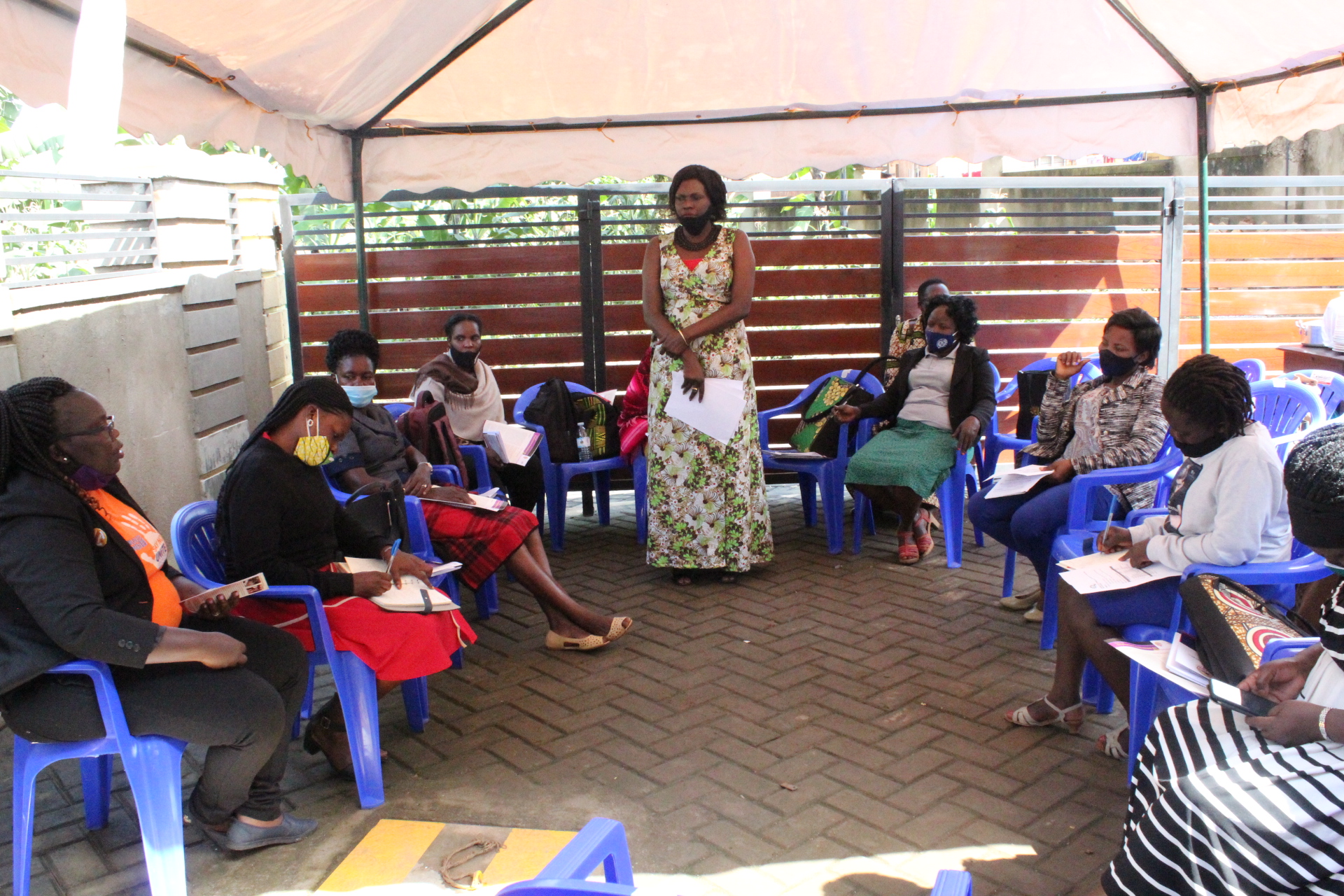
On the 27th November 2020, a group of Women Human Rights Defenders convened at the Alliance Of Women Advocating for Change offices to commemorate the International Day of Women Human Rights Defenders that is celebrated on 29th November every year. The theme for this years commemoration was “In the uncertain times of COVID-19: WHRDN-U calls for the recognition of the essential work of Women Human Rights Defenders.”

Mary Lamunu, the coordinator of Uganda Women Parliamentary Association spoke about the importance of adding a gender lens to the Human Rights Defenders Bill 2020.
Some of the key messages shared by Women Human Rights Defenders as they commemorated the International Women Human Rights Day
💬I am Mary Asili a WHRD supporting survivors of gender based violence from Tororo Mifumi. COVID-19 changed the way we did our work. Access to services by GBV survivors was a challenge, survivors were told not to report cases to police until the lock down was lifted. pic.twitter.com/mWlmA18HSU
— Women Human Rights Defenders Network- Uganda (@WHRDNU) November 27, 2020
Betty from Mbale, working for the rights of LBQTI and sex workers. 💬As a WHRD I was intimidated and feared to continue doing my work. Efforts to enforce curfews and lockdowns resulted into fear by women and girls to go to hospital to seek sexual reproductive health care. pic.twitter.com/651MsbWen3
— Women Human Rights Defenders Network- Uganda (@WHRDNU) November 27, 2020
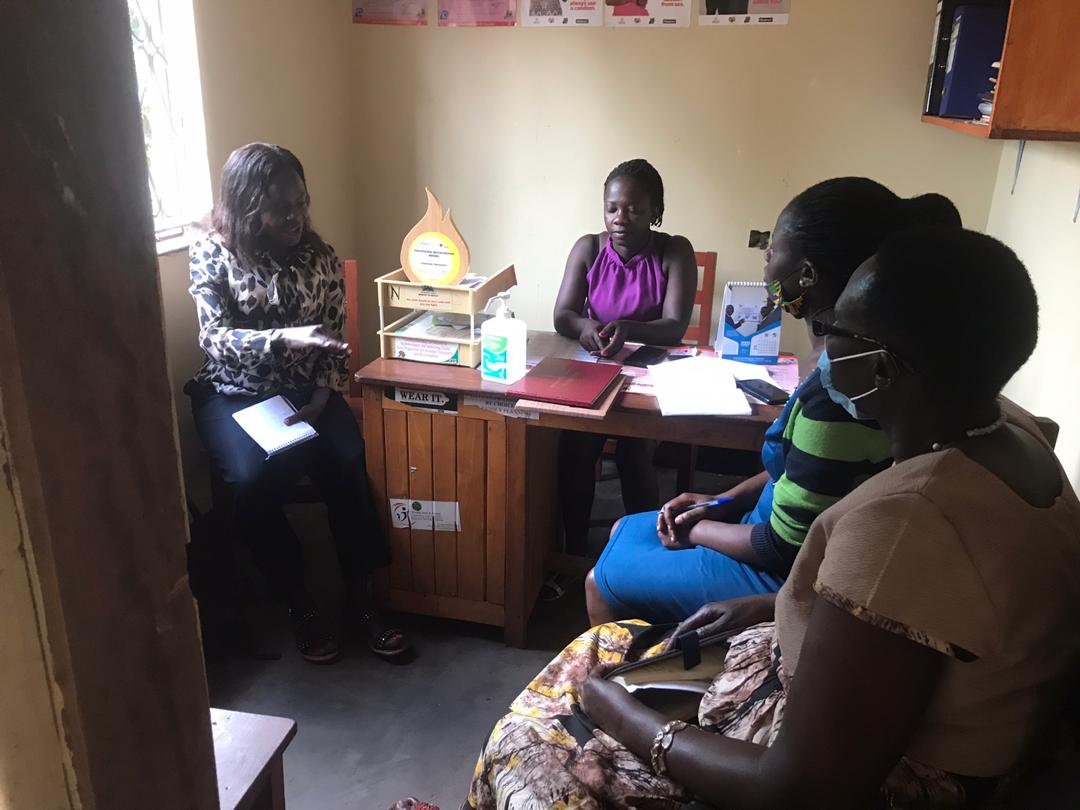
The WHRDN-U has continued amplifying the voices of Women Human Rights Defenders at all levels during the COVID-19 pandemic. We have submitted to the UN Humans Rights Office stories of frontline defenders, press statements, virtual networking, advocacy meetings and continued support to WHRDS at risk.
We also conducted solidarity visits to WHRDs in danger and provided referral services to WHRDs to access services from like minded organizations. WHRDN-U will continue amplifying the voices of WHRDs and remain committed to provide support to those at risk during and post the COVID-19 pandemic.